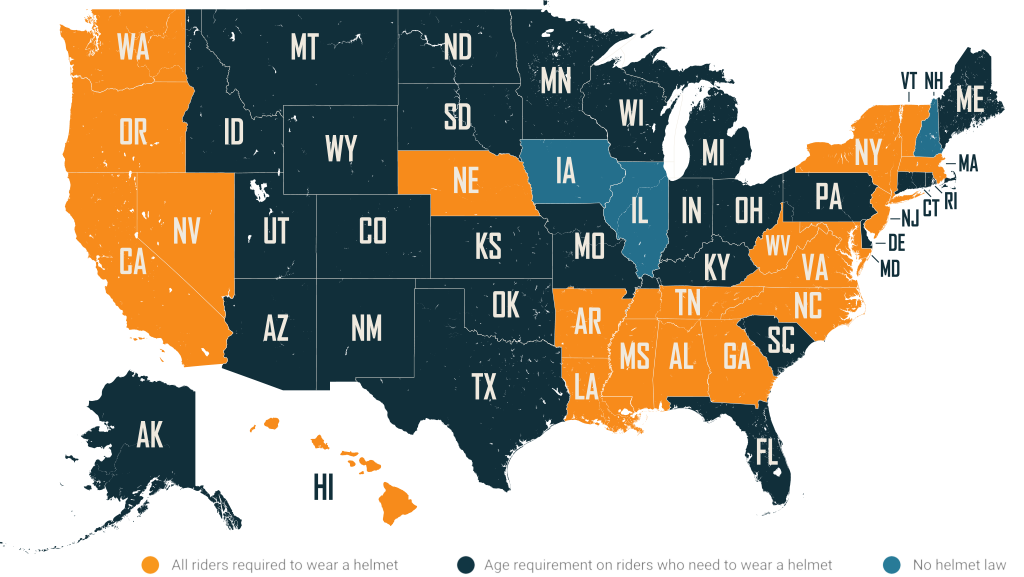Helmet Law States

States with Universal Helmet Laws
There are currently 19 states and the District of Columbia that have universal helmet laws. These laws require all riders, regardless of age or experience, to wear a helmet while on a motorcycle. The states with universal helmet laws are:
- Alabama
- California
- Georgia
- Louisiana
- Maine
- Maryland
- Massachusetts
- Michigan
- Mississippi
- New York
- North Carolina
- Oregon
- Pennsylvania
- Rhode Island
- South Carolina
- Tennessee
- Texas
- Virginia
- West Virginia
- District of Columbia
States with Partial Helmet Laws
There are 28 states that have partial helmet laws. These laws require only certain riders to wear helmets, such as those under a certain age, those with a certain amount of riding experience, or those who do not have a certain amount of insurance coverage. The states with partial helmet laws are:
- Alaska
- Arizona
- Arkansas
- Colorado
- Connecticut
- Delaware
- Florida
- Hawaii
- Idaho
- Indiana
- Iowa
- Kansas
- Kentucky
- Minnesota
- Missouri
- Montana
- Nebraska
- Nevada
- New Hampshire
- New Mexico
- North Dakota
- Ohio
- Oklahoma
- South Dakota
- Utah
- Washington
- Wisconsin
- Wyoming
States without Helmet Laws
There are only three states that do not have any helmet laws: Illinois, Iowa, and New Hampshire. In these states, riders are free to choose whether or not to wear a helmet while riding a motorcycle.
Pros and Cons of Helmet Laws
There are arguments for and against mandatory helmet laws. Those in favor of such laws argue that they save lives and reduce the severity of injuries in motorcycle accidents. They also point out that the cost of treating head injuries from motorcycle accidents can be very high, and that universal helmet laws can reduce these costs.
Those against mandatory helmet laws argue that they infringe on individual freedom and personal choice. They also argue that helmets can limit a rider's visibility and hearing, making it more difficult to avoid accidents.
FAQ
1. Are helmet laws effective?
Yes, studies have shown that helmet laws can reduce the number of fatalities and serious injuries in motorcycle accidents.
2. Do helmet laws reduce motorcycle use?
There is no evidence to suggest that helmet laws reduce the number of people who ride motorcycles.
3. What are the penalties for violating helmet laws?
The penalties for violating helmet laws vary by state, but they can include fines and points on your driver's license.
4. Can helmets prevent all head injuries?
No, helmets cannot prevent all head injuries in motorcycle accidents, but they can significantly reduce the severity of such injuries.
Conclusion
Helmet laws vary widely across the US. Some states require all riders to wear helmets, while others have partial helmet laws or no helmet laws at all. While there are arguments for and against mandatory helmet laws, it is clear that helmets can save lives and reduce the severity of injuries in motorcycle accidents. It is important for riders to understand the helmet laws in their state and to always wear a helmet while riding a motorcycle.
